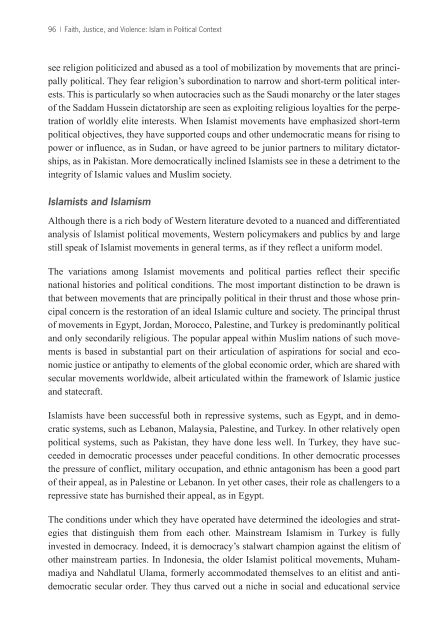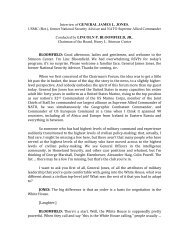Islam and Politics - The Stimson Center
Islam and Politics - The Stimson Center
Islam and Politics - The Stimson Center
Create successful ePaper yourself
Turn your PDF publications into a flip-book with our unique Google optimized e-Paper software.
96 | Faith, Justice, <strong>and</strong> Violence: <strong>Islam</strong> in Political Context<br />
see religion politicized <strong>and</strong> abused as a tool of mobilization by movements that are principally<br />
political. <strong>The</strong>y fear religion’s subordination to narrow <strong>and</strong> short-term political interests.<br />
This is particularly so when autocracies such as the Saudi monarchy or the later stages<br />
of the Saddam Hussein dictatorship are seen as exploiting religious loyalties for the perpetration<br />
of worldly elite interests. When <strong>Islam</strong>ist movements have emphasized short-term<br />
political objectives, they have supported coups <strong>and</strong> other undemocratic means for rising to<br />
power or influence, as in Sudan, or have agreed to be junior partners to military dictatorships,<br />
as in Pakistan. More democratically inclined <strong>Islam</strong>ists see in these a detriment to the<br />
integrity of <strong>Islam</strong>ic values <strong>and</strong> Muslim society.<br />
<strong>Islam</strong>ists <strong>and</strong> <strong>Islam</strong>ism<br />
Although there is a rich body of Western literature devoted to a nuanced <strong>and</strong> differentiated<br />
analysis of <strong>Islam</strong>ist political movements, Western policymakers <strong>and</strong> publics by <strong>and</strong> large<br />
still speak of <strong>Islam</strong>ist movements in general terms, as if they reflect a uniform model.<br />
<strong>The</strong> variations among <strong>Islam</strong>ist movements <strong>and</strong> political parties reflect their specific<br />
national histories <strong>and</strong> political conditions. <strong>The</strong> most important distinction to be drawn is<br />
that between movements that are principally political in their thrust <strong>and</strong> those whose principal<br />
concern is the restoration of an ideal <strong>Islam</strong>ic culture <strong>and</strong> society. <strong>The</strong> principal thrust<br />
of movements in Egypt, Jordan, Morocco, Palestine, <strong>and</strong> Turkey is predominantly political<br />
<strong>and</strong> only secondarily religious. <strong>The</strong> popular appeal within Muslim nations of such movements<br />
is based in substantial part on their articulation of aspirations for social <strong>and</strong> economic<br />
justice or antipathy to elements of the global economic order, which are shared with<br />
secular movements worldwide, albeit articulated within the framework of <strong>Islam</strong>ic justice<br />
<strong>and</strong> statecraft.<br />
<strong>Islam</strong>ists have been successful both in repressive systems, such as Egypt, <strong>and</strong> in democratic<br />
systems, such as Lebanon, Malaysia, Palestine, <strong>and</strong> Turkey. In other relatively open<br />
political systems, such as Pakistan, they have done less well. In Turkey, they have succeeded<br />
in democratic processes under peaceful conditions. In other democratic processes<br />
the pressure of conflict, military occupation, <strong>and</strong> ethnic antagonism has been a good part<br />
of their appeal, as in Palestine or Lebanon. In yet other cases, their role as challengers to a<br />
repressive state has burnished their appeal, as in Egypt.<br />
<strong>The</strong> conditions under which they have operated have determined the ideologies <strong>and</strong> strategies<br />
that distinguish them from each other. Mainstream <strong>Islam</strong>ism in Turkey is fully<br />
invested in democracy. Indeed, it is democracy’s stalwart champion against the elitism of<br />
other mainstream parties. In Indonesia, the older <strong>Islam</strong>ist political movements, Muhammadiya<br />
<strong>and</strong> Nahdlatul Ulama, formerly accommodated themselves to an elitist <strong>and</strong> antidemocratic<br />
secular order. <strong>The</strong>y thus carved out a niche in social <strong>and</strong> educational service

















